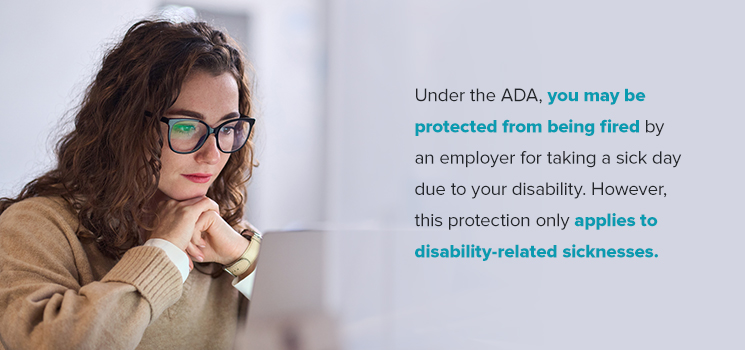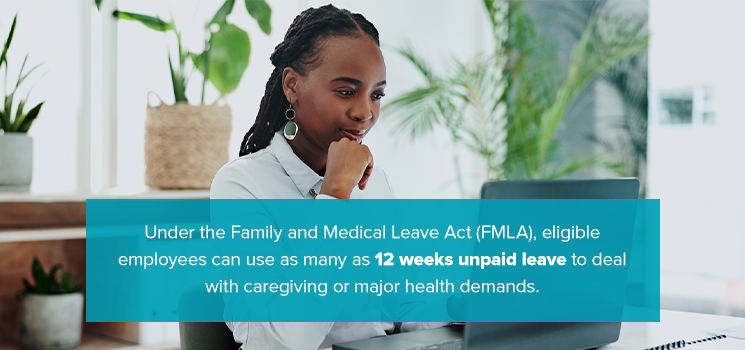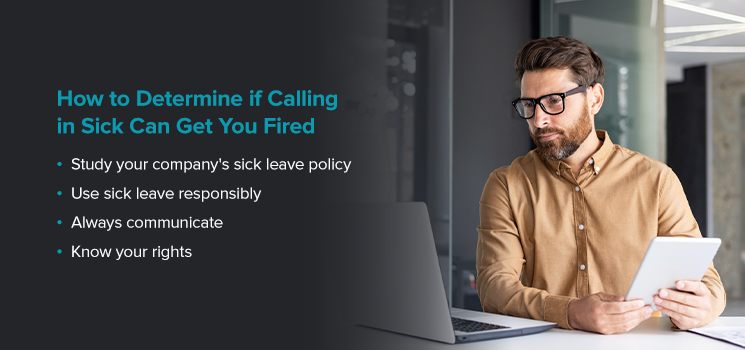By Weisberg Cummings, P.C. on June 12th, 2024

Most employers have policies that cover sick leave, and if an employee does not follow the rules established by these policies, they can be fired for taking a sick day. Many employers expect employees to notify them if they will not be coming in to work for the day.
Understanding your employer’s policies and the legal exceptions can help you make informed decisions when you need a sick day.
Employment Contracts
Though Pennsylvania is an at-will state, your employment contract may include a stipulation that protects you from potentially getting fired for being sick. If you are an employee working under a contract that states your employer cannot fire you for using a sick day under most conditions, then your employer likely will not be able to fire you for taking a sick day.
You can get fired for calling out of work if your employer believes you are misusing sick days.
Be aware that many employees who are not in a union do not have a contract of employment, however, and most employee handbooks do not create a legally binding contract.
Americans With Disabilities Act
Can you be fired for calling in sick under the Americans with Disabilities Act (ADA)? Another exception to this state’s at-will rule is if you have a disability. Under the ADA, you may be protected from being fired by an employer for taking a sick day due to your disability. However, this protection only applies to disability-related sicknesses. Unrelated illness may still open you up to the risk of employment termination. The ADA applies to employers with at least 15 employees, while the Pennsylvania Human Relations Act (PHRA) provides similar protections in Pennsylvania and covers employers with as few as 4 employees
The ADA also states that employers should make reasonable accommodations for employees with disabilities, including work schedule adjustments, modifications to the workspace and reallocation of certain non-essential tasks and job duties that an employee with a disability cannot perform.
For an employee to receive the protections offered by the ADA, including additional sick leave, they must disclose their disability to the employer. Employers must have internal processes that allow employees to request additional sick leave and document their needs formally. Your employer can still fire you if they have just cause, despite the ADA. These scenarios give your employer the legal right to fire you when you call in sick with a disability:
- If their choice to terminate your employment is unrelated to your disability.
- If your disability poses a direct workplace health and safety threat.
- If you fail to meet the requirements for your vocation, like the inability to meet performance or production standards with reasonable accommodation.
- If your need for time off prevents you from performing the essential functions of your job or creates an undue hardship for your employer.
The Family and Medical Leave Act
Under the Family and Medical Leave Act (FMLA), eligible employees can use as many as 12 weeks unpaid leave to deal with caregiving or major health demands. The FMLA aims to allow employees to balance family and work responsibilities, along with accommodating the legitimate interests of employers and promoting equal opportunity for employment for men and women. Employees can use FMLA leave while:
- Recovering after surgery.
- Caring for their newborn baby.
- Getting treatment for a serious health condition or a chronic illness.
- Caring for an immediate family member who is sick, such as a spouse, parent or child.
When you submit your request for time off to your employer, you do not have to ask for FMLA leave specifically. Instead, your employer should understand that you qualify for FMLA leave due to the circumstances in your request. However, not every employee is eligible for FMLA leave. To meet the eligibility requirements, you must:
- Have worked for your employer for a minimum of 12 months.
- Be working in a location in which your company employs a minimum of 50 employees within 75 miles.
- Have worked for your employer for a minimum of 1,250 hours within the past 12 months.
Wrongful termination under the FMLA can include:
- You were fired because you were sick — note this does not extend to simply calling in sick.
- Getting fired because you filed for disability and your employer found out.
- After coming back from maternity or disability leave, you are let go from your position or your hours suddenly decrease.
- If, after informing your employer that you will need to take maternity leave, you are fired.
You can choose to take FMLA leave in a single lump sum, or you can choose to use it to temporarily scale back on the number of hours or days you work. Your employer should keep your job available for you when you return to work or an equivalent position with the same duties, location, pay and benefits. You must also continue receiving your benefits during your leave, such as your health insurance.
How to Determine if Calling in Sick Can Get You Fired
Empower yourself by ensuring you understand the various ways a sick day can result in employment termination:
- Study your company’s sick leave policy: Your employee handbook should contain your company’s sick leave policy. Ensure you understand what you are entitled to and which procedures to follow for calling out of work. Sticking to these policies may help to protect your job status, although the policies themselves are often just guidelines and do not create legal rights.
- Use sick leave responsibly: Only use your sick days when you are sick, and avoid calling in sick more than you need to without a valid medical reason. Visiting your doctor can also help you decide if it is necessary to call in sick.
- Always communicate: Call to let your employer or manager know you cannot make it to work due to illness. If you are unconscious or hospitalized, reach out as soon as possible and provide a note from your physician.
- Know your rights: If you are unsure, educate yourself about wrongful termination and contact a professional who can advise you on your rights. This will help you protect yourself and your job.
Speak to an Experienced Employment Lawyer at Weisberg Cummings, P.C.
At Weisberg Cummings, P.C., we are often approached by clients who got fired for being sick. Our employment lawyers provide workers in Pennsylvania with legal assistance in various employment matters. When you choose our firm to represent you, we will offer you personal, thoughtful service and take the time to understand your situation and goals. Additionally, you will have the opportunity to be involved in creating a legal strategy for your case that meets your goals.
Do you believe you may have been fired for taking a sick day? Speak to an experienced employment lawyer at Weisberg Cummings, P.C to schedule a free consultation, or call us at (855) 716-2367.




